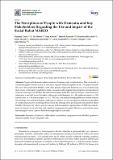The perceptions of people with dementia and key stakeholders regarding the use and impact of the social robot MARIO
Date
2020-11-20Author
Casey, Dympna
Barrett, Eva
Kovačič, Tanja
Sancarlo, Daniele
Ricciardi, Francesco
Murphy, Kathy
Koumpis, Adamantios
Santorelli, Adam
Gallagher, Niamh
Whelan, Sally
Metadata
Show full item recordUsage
This item's downloads: 49 (view details)
Cited 1 times in Scopus (view citations)
Recommended Citation
Casey, Dympna, Barrett, Eva, Kovacic, Tanja, Sancarlo, Daniele, Ricciardi, Francesco, Murphy, Kathy, Koumpis, Adamantios, Santorelli, Adam, Gallagher, Niamh, Whelan, Sally. (2020). The Perceptions of People with Dementia and Key Stakeholders Regarding the Use and Impact of the Social Robot MARIO. International Journal of Environmental Research and Public Health, 17(22). doi: 10.3390/ijerph17228621
Published Version
Abstract
People with dementia often experience loneliness and social isolation. This can result in increased cognitive decline which, in turn, has a negative impact on quality of life. This paper explores the use of the social robot, MARIO, with older people living with dementia as a way of addressing these issues. A descriptive qualitative study was conducted to explore the perceptions and experiences of the use and impact of MARIO. The research took place in the UK, Italy and Ireland. Semi-structured interviews were held in each location with people with dementia (n = 38), relatives/carers (n = 28), formal carers (n = 28) and managers (n = 13). The data was analyzed using qualitative content analysis. The findings revealed that despite challenges in relation to voice recognition and the practicalities of conducting research involving robots in real-life settings, most participants were positive about MARIO. Through the robot’s user-led design and personalized applications, MARIO provided a point of interest, social activities, and cognitive engagement increased. However, some formal carers and managers voiced concern that robots might replace care staff.


